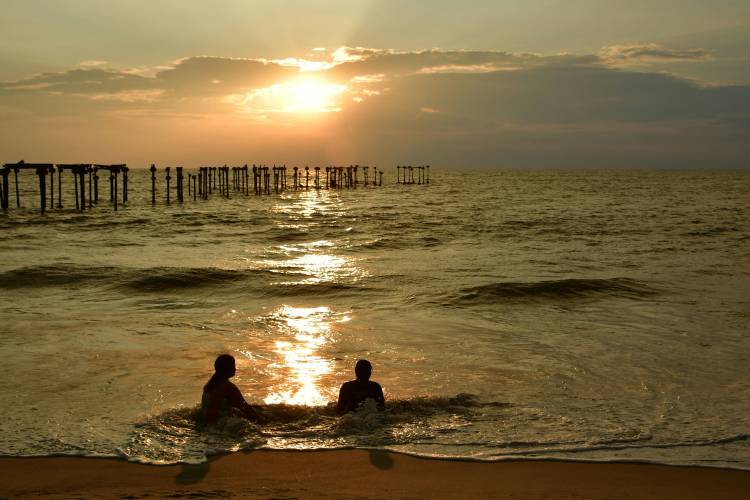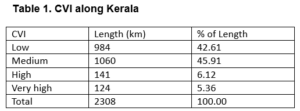
Kerala, a state known for its rich cultural heritage and high literacy rates, faces a significant threat from climate change-induced high-tide flooding. With over 70% of its population living in the coastal districts, the state’s densely populated 600-km shoreline has seen increased habitation pressure over the past three decades. A study by the National Centre for Coastal Research highlights the alarming rate at which India’s coastline, including Kerala’s, is eroding. In the past 26 years, almost one-third of the coastline has been lost, exacerbating the vulnerability of coastal communities.
One of the viable solutions proposed to combat the effects of high-tide flooding is the expansion of mangrove forests. Mangroves act as natural barriers, absorbing the energy of storm surges and reducing the impact on coastal areas. Activists have already planted mangrove saplings on over 5,000 acres, demonstrating the potential of this intervention. Additionally, research by CSIR has developed a type of brick that can withstand saltwater damage, offering innovative construction solutions for flood-prone areas.
READ | Green gambit: India’s ambitious attempt to achieve net zero
Gender dimension of climate vulnerability
The impact of climate change disproportionately affects women who make up 60% of the world’s poorest and most vulnerable populations. Women in coastal areas of Kerala face unique challenges due to lesser access to resources such as land, credit, education, and technology. This gender disparity is further compounded by differential consumption patterns, decision-making processes, and gender-blind laws and regulations.

Recognising these challenges, climate change interventions must adopt a gender-sensitive approach. Shifting the perspective from viewing women as passive victims to active agents of change is crucial. This approach aligns with the evolving global discourse on climate justice, which emphasises inclusive and socially just solutions over purely technocratic and science-driven models.
Kerala’s approach to sustainable development
Kerala has a history of pioneering people-centred sustainable development interventions. The state’s unique reforms, such as the Land Reforms Act and the People’s Planning Campaign, have laid a strong foundation for equitable and inclusive development. Kerala’s democratic and decentralised governance model empowers local communities and NGOs, fostering grassroots environmental action linked to sustainability.
Local self-government institutions and NGOs play a crucial role in implementing sustainable development projects in Kerala. The decentralised governance model allows for greater community involvement and ensures that interventions are tailored to local needs. The Kudumbashree network, for instance, has been instrumental in mobilising women and facilitating participatory planning processes. This grassroots approach not only empowers communities but also ensures that development initiatives are more inclusive and effective.
Addressing high-tide flooding
The coastal villages of Central Kerala, particularly on Vypin Island, are experiencing severe high-tide flooding throughout the year. The island, with a population density four times that of Kerala, faces significant environmental and health challenges due to constant tidal flooding. Houses are collapsing, sanitation systems are failing, and livelihoods are being destroyed.
To combat these issues, a project supported by the US government and various organisations, including the MS Swaminathan Foundation and Tata Institute of Social Sciences (TISS), is co-creating community resilience through a disaster preparedness system. This project focuses on three panchayats—Ezhikkara, Puthenvellikara, and Kumbalangi.
The high-tide flooding has severely compromised the sanitation infrastructure in affected areas. Pit latrines overflow, and toilets become non-functional during high tides, leading to significant health hazards. The constant exposure to filthy water has resulted in widespread skin diseases and other health issues. Addressing these challenges requires redesigning sanitation systems to withstand flooding and ensuring access to clean drinking water for all households. These measures are critical for improving public health and enhancing community resilience.
Empowering communities through participatory approaches
The project adopts a rights-based, gender-sensitive approach to climate change adaptation and mitigation. It emphasises the participation of local communities in decision-making processes and the production of knowledge. Key interventions include:
Community Mapping: Women from the Kudumbashree network, trained as community researchers, conducted participatory resource mapping of high-tide affected areas. This process produced new local-level data, challenging the normative, expert-driven data sets and promoting gender-responsive knowledge production.
Community Video: Women were trained to create short videos documenting their experiences with high-tide flooding. These videos serve as valuable data for planning climate adaptation and mitigation interventions, while also raising public awareness and promoting gender-sensitive climate discourses.
Community Theatre: Drawing on the traditions of Augusto Boal and Badal Sircar, community theatre activities engaged local residents in exploring and challenging their hegemonic social consciousness. This approach fostered a counter-hegemonic consciousness and empowered the community to assert their agency in addressing climate change.
The project’s interventions highlight the importance of incorporating critical social science perspectives into mainstream climate debates. A gender-sensitive, inclusive, and participatory approach to climate change is essential for creating transformative change. This involves embracing hybrid perspectives and co-production of knowledge, tackling power and gender imbalances, and ensuring that local communities are active participants in climate policy and intervention processes.
By focusing on the lived experiences of coastal communities and promoting gender-responsive strategies, Kerala can lead the way in building resilient and sustainable communities capable of facing the challenges of climate change.
(Manjula Bharathy is Professor at School of Habitat Studies, Mumbai.)
